Kuwait bans waterpipes and creates national awareness during COVID-19
Introduction
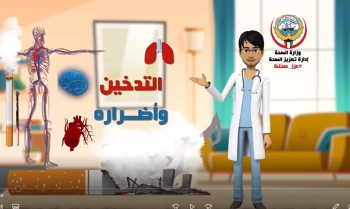 Kuwait’s Ministry of Health ramped up health awareness activities including tobacco control, in response to the COVID-19 pandemic. The Ministry launched, on 31 March 2020, a national campaign to raise awareness of COVID-19 risks and protection measures. Kuwait’s Ministry of Health is focusing on two main areas in tobacco control: enforcing a ban on waterpipe use in public places and a national awareness campaign. The Ministry is collaborating closely with several ministries and sectors to facilitate these efforts, whilst considering the challenges posed by most staff working remotely which prolongs the time for interaction and activities.
Kuwait’s Ministry of Health ramped up health awareness activities including tobacco control, in response to the COVID-19 pandemic. The Ministry launched, on 31 March 2020, a national campaign to raise awareness of COVID-19 risks and protection measures. Kuwait’s Ministry of Health is focusing on two main areas in tobacco control: enforcing a ban on waterpipe use in public places and a national awareness campaign. The Ministry is collaborating closely with several ministries and sectors to facilitate these efforts, whilst considering the challenges posed by most staff working remotely which prolongs the time for interaction and activities.
Ban on waterpipes in public places
The Kuwait National Assembly held an exceptional session and amended Article (17) of Law 8/1969 on health precautions to prevent communicable diseases. The modifications included closing all places and shops that could be a potential source of infection and increasing the severity of penalties in cases of violations. The Department of Legal Affairs in the Ministry of Health is working closely with the Ministry of Interior to implement these amendments. Kuwait’s Ministry of Health recommended the closure of all places selling or using waterpipes. The Municipality of Kuwait fully enforced this recommendation by closely communicating with Municipality Managers and conducting regular inspections. Violations were met with a few penalties depending on the extent of the violation. Penalties ranged from fines (5000 up to 30 000 Kuwaiti Dinars), confiscation of waterpipes to imprisonment (3 months up to 10 years). However, using waterpipes in the privacy of homes and especially by youth still poses a challenge.
The existing ban during COVID-19 has demonstrated its feasibility given the close collaboration of the different ministries and government bodies. Dr Amaal Al-Yehia, Rapporteur of the Ministry of Health National Anti-smoking Programme, stated: “We successfully implemented the ban so would like to use this in future as evidence of what can be achieved”.
Recognition of World No Tobacco Day and linking its activities to COVID-19
The National Anti-smoking Programme launched a national awareness campaign to coincide with World No Tobacco Day 2020. The campaign focused on showing the link between tobacco use and the transmission of the virus and the severity of the disease that causes COVID-19. The campaign stressed on the importance of controlling tobacco use and banning the use of waterpipes at this critical time.
The campaign consisted of videos, a speech and press engagement. Two videos were disseminated through mass media and various social media platforms (Twitter, Instagram and YouTube). The speech by the Head of the National Anti-smoking Programme was broadcast on national television and its official channels. Key television programmes hosted National Anti-smoking Programme officials through interviews to advocate tobacco cessation and the ban on the use of waterpipes. Kuwait’s Ministry of Health holds a daily press conference to update the public on developments of the pandemic. His Excellency the Minister of Health and official spokespeople use the press conference as a platform to disseminate key messages, including the accumulating evidence which links smoking and increasing severity of COVID-19.
Way forward
The Government of Kuwait has developed a country-wide transition plan outlining the eventual return to normal activities, subject to the COVID-19 situation across the country. The plan consists of five phases, each lasting three weeks. The first phase started on 31 May 2020. At the end of each phase, the COVID-19 situation will be reviewed and assessed. Transition to the next phase will depend on the recommendation of the Ministry of Health based on rates of virus control.
Future plans are in place to continue the ban on tobacco use in public places especially waterpipes after the transitional phases. Kuwait’s Ministry of Health plans to run ongoing awareness campaigns throughout the year and beyond the transitional phases.
To feed into future studies showing the link between smoking and COVID-19, Kuwait’s Ministry of Health recommended that for all diagnosed or suspected COVID-19 patients, smoking history should be always completed as part of taking their medical history.
The National Anti-smoking Programme will continue to collaborate closely with the World Health Organization and plan a joint event in the near future. The Programme has started to work with the Ministry of Industry to regulate the Electronic Nicotine Delivery Systems by developing a legislation for a Kuwaiti Standard Specification.
Related links
The implementation stage of the amendments to the health law starts (Aljarida)
Bahrain bans waterpipes and creates national awareness during COVID-19
Introduction
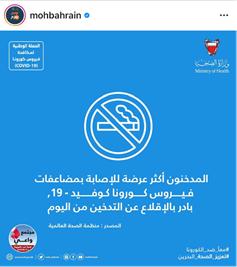 The Government of Bahrain set up the Executive Committee headed by His Royal Highness Prince Salman bin Hamad Al Khalifa, the Crown Prince, Deputy Supreme Commander and First Deputy Prime Minister in response to the COVID-19 pandemic. The Committee monitors and places measures to prevent the spread of COVID-19. In addition, a National Taskforce for Combating the Coronavirus (COVID-19) has been set up. Tobacco control activities during this critical time include a ban on waterpipe use in public places and a national awareness campaign.
The Government of Bahrain set up the Executive Committee headed by His Royal Highness Prince Salman bin Hamad Al Khalifa, the Crown Prince, Deputy Supreme Commander and First Deputy Prime Minister in response to the COVID-19 pandemic. The Committee monitors and places measures to prevent the spread of COVID-19. In addition, a National Taskforce for Combating the Coronavirus (COVID-19) has been set up. Tobacco control activities during this critical time include a ban on waterpipe use in public places and a national awareness campaign.
Ban on waterpipes in public places
The Executive Committee issued a decision, on 17 March 2020, closing all restaurants and cafés serving waterpipes for one month. Bahrain’s Ministry of Health inspectors are ensuring that the ban is enforced, and violations are reported. The ban on waterpipes will remain in effect until further notice, however, cafes and restaurants are lobbying for the use of disposable waterpipes outdoors.
The Minister of Trade issued a decision, on 23 April 2020, to ban delivery of all tobacco products including waterpipes. The decision was issued to combat cafés which were continuing to deliver waterpipes to homes. This decision was supported by a number of penalties such as closing down the cafés and imposing hefty fines for violators. In an incident published in newspapers, a café was violating the ban and its owners were fined 9000 Bahraini Dinars (around USD 25 000) in addition to an initial bail amounting to 2000 Bahraini Dinars (around USD 5000). These fines were deliberately high to set an example to other cafés. Currently, a trial is underway for the owners of another café because it was operating secretly, in addition to imposing a hefty fine.
The close collaboration between the ministries of health, interior and trade continues to enforce the anti-tobacco and general health laws in spite of most of the efforts currently being dedicated to COVID-19. Recently, the Ministry of Trade has been granted judicial powers similar to those held by the ministries of health and interior to enforce the laws.
Awareness campaigns during COVID-19
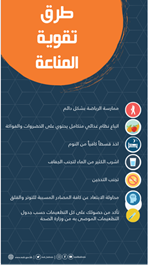 Bahrain’s Ministry of Health launched a campaign based on posters showing the link between tobacco use and the transmission of the virus that causes COVID-19. To coincide with World No Tobacco Day 2020, Her Excellency the Minister of Health put out a statement on tobacco use as one of the risk factors for COVID-19.
Bahrain’s Ministry of Health launched a campaign based on posters showing the link between tobacco use and the transmission of the virus that causes COVID-19. To coincide with World No Tobacco Day 2020, Her Excellency the Minister of Health put out a statement on tobacco use as one of the risk factors for COVID-19.
Way forward
Current efforts are paving the way to be able to extend the ban on waterpipes beyond the COVID-19 pandemic. Dr. Ejlal AlAlawi, Head of Anti-Smoking Group at the Public Health Directorate and Focal Point of Tobacco Control at the Bahrain Ministry of Health stated: “I expect that cafés which serve waterpipes will not go back to their activities easily”.
Related links
A café fined 9000 Bahraini Dinars for violating the ban
Bahrain’s Government Executive Committee introduces additional COVID-19 precautionary measures
الدكتور اللواتي من سلطنة عُمان يحصل على جائزة المدير الإقليمي الخاصة لعام 2018
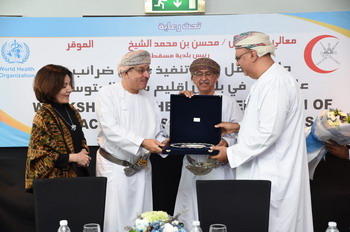
29 كانون الثاني/يناير 2019 - اختارت منظمة الصحة العالمية الدكتور جواد اللواتي، كبير المستشارين في وزارة الصحة في سلطنة عُمان لتلقي جائزة المدير الإقليمي الخاصة لعام 2018، وذلك في حلقة عمل إقليمية عُقدت في الفترة من 21 إلى 23 كانون الثاني/يناير 2019. قد سُلِّمت الجائزة إلى الدكتور اللواتي من معالي الدكتور أحمد بن عبيد السعيدي، وزير الصحة في سلطنة عمان، وسعادة المهندس محسن بن محمد الشيخ، رئيس بلدية مسقط، والدكتورة أكجمال ماجتيموفا، ممثلة منظمة الصحة العالمية في عُمان. وقد قُدِّمت هذه الجائزة إلى الدكتور اللواتي تقديرًا لمساهماته البارزة والتزامه بمكافحة التبغ في بلده وعلى الصعيدين العالمي والإقليمي.
والدكتور جواد اللواتي عمل كعضو منتخب في مكتب مؤتمر الأطراف، حيث مثّل إقليم منظمة الصحة العالمية لشرق المتوسط طوال السنوات الأربع الماضية. وخلال هذا الوقت، عمل الدكتور اللواتي مع الأطراف في اتفاقية منظمة الصحة العالمية الإطارية بشأن مكافحة التبغ، ودعمهم في الإقليم، لدفع جدول أعمال مكافحة التبغ الإقليمي إلى الأمام تمشيًا مع الالتزامات المتعهَد بها في الاتفاقية. وهو يعمل الآن كمنسق إقليمي منتخب، يمثل إقليم منظمة الصحة العالمية لشرق المتوسط، في المكتب الحالي لمؤتمر الأطراف، الذي انتخبه المؤتمر في دورته الثامنة من 1 إلى 6 تشرين الأول/أكتوبر 2018 في جنيف، سويسرا.
وتشمل جهود الدكتور اللواتي العديدة ومنجزاته ما يلي:
- مساعدة وزارات الصحة في لبنان والمملكة العربية السعودية والجمهورية العربية السورية في وضع استراتيجية وطنية وخطة عمل وطنية لمكافحة التبغ.
- إصدار التشريعات الخاصة بمنع التدخين في الأماكن العامة (كعضو في مجلس بلدية مسقط، ممثلاً عن وزارة الصحة) والذي دخل حيز التنفيذ لاحقًا من خلال الجهود المشتركة وشمل جميع البلديات الأربع.
- تنفيذ البرامج الوطنية لمكافحة التبغ والوقاية من الأمراض غير السارية ومكافحتها، ولا سيما داء السكري والسرطان والمرض القلبي الوعائي.
- الحفاظ على أولوية مكافحة التبغ في جدول أعمال الصحة في سلطنة عُمان من خلال الدعوة، وتنفيذ نظم الترصد، والمشاركة مع العديد من أصحاب المصلحة، ومن خلال الأنشطة المستمرة.
السعودية تعتمد التغليف البسيط لمنتجات التبغ: خطوة رائدة في مكافحة التبغ
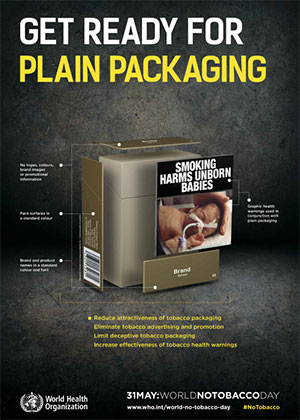
17 كانون الأول/ديسمبر 2018 - أبلغت الهيئة السعودية للغذاء والدواء مصنعي منتجات التبغ ومستورديه بالاستعداد لتطبيق التغليف البسيط على جميع عبوات منتجات التبغ. وقد اتخذت هذه الخطوة بناء على التعاون الوثيق مع مكتب منظمة الصحة العالمية الإقليمي لشرق المتوسط، وتماشياً مع اتفاقية منظمة الصحة العالمية الإطارية بشأن مكافحة التبغ ومبادئها التوجيهية، والتي أصبحت المملكة العربية السعودية طرفًا فيها.
فالتغليف البسيط يعرض الأسماء التجارية وأسماء المنتجات بنمط معياري موحد للون والخط، ويحظر استخدام الشعارات والألوان وصور العلامة التجارية أو المعلومات الترويجية (داخل أو خارج عبوة التبغ). وهذه خطوة رائدة لمكافحة التبغ لأن التغليف البسيط هو واحد من أكثر التدخلات الصحية العامة فعالية في الحد من الطلب على التبغ. كما أن التغليف البسيط:
- يحفز عزم المدخنين على الإقلاع عن التبغ.
- يقلل جاذبية منتجات التبغ.
- يقيد استغلال تغليف التبغ كشكل من أشكال الإعلان عن التبغ والترويج له.
- يحد من المعلومات المضللة الموجودة على التغليف والتوسيم.
- يزيد من فعالية التحذيرات الصحية.
تُعد المملكة العربية السعودية واحدة من أوائل البلدان القليلة في العالم التي تطبق التغليف البسيط، والبلد الوحيد في الإقليم الذي يقوم بذلك.
متى يصبح التغليف البسيط ساري المفعول في المملكة العربية السعودية؟
منحت الهيئة السعودية للغذاء والدواء مصنعي منتجات التبغ ومستورديه فترة سماح حتى 1 أيار/مايو 2019. وعدم الامتثال بهذا التاريخ سيخضعهم للإجراءات القانونية. وفي إطار الاستعداد لهذا الأمر، أصدرت الهيئة السعودية للغذاء والدواء "نموذج للتغليف البسيط" لتوجيه جميع مصنعي هذه المنتجات ومستورديها حول إعداد التغليف البسيط لمنتجات السجائر والنرجيلة، بالإضافة إلى جميع منتجات التبغ الأخرى، سواء التبغ الذي يُدخن والتبغ عديم الدخان. ويوفر هذا "النموذج" تفاصيل حول اللون الموحد ونمط الخط الموحد الذي سيستخدم، ويتضمن أيضًا عينة من التحذيرات الصحية المراد وضعها على العبوات. ويؤمل أن تسهم هذه الخطوة الثورية في تحقيق جدول أعمال السعودية في مكافحة التبغ، والذي يتماشى مع رؤيتها لعام 2030 لتعزيز الصحة العامة.
تعرف علي المزيد حول التغليف البسيط
انظر أحدث إحصائيات متعلقة بالتبغ في المملكة العربية السعودية


